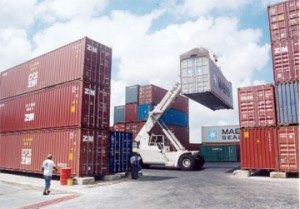-businessman
The commitment given by Georgetown Chamber President, Chandradat Chintamani that collaboration between the Chamber and the Customs and Trade Administration should reduce the length of the clearance period for goods arriving at ports for Christmas will only be realized if inspection mechanisms are put in place to “directly oversee the operational side of customs clearance,” a city businessman has told Stabroek Business.
Responding to a recent announcement by the Georgetown Chamber of Commerce and Industry (GCCI) Chairman that talks with the Customs and Trade Administration should see a reduction in the waiting time, the businessman said that it will take more than “agreements in principle” to remove the bottlenecks at Customs.
“If you examine the problem carefully what you will find is that the delays are not due to the absence of procedures. The procedures are there. The problem lies in the operationalizing of those procedures. What you will find is that the procedures are often put to one side during the actual process of clearing goods,” the businessman said.
Two weeks ago Chintamani told Stabroek Business that the initiative by GCCI and the Customs and Trade Administration was designed to ensure the smooth flow of goods to the market during the Christmas period. But the businessman told Stabroek Business that he believed that “some of the inefficiencies on the ground” are deliberately designed to create what he described as “an environment in which corruption can thrive.”

According to the businessman “the whole culture of the relationship between the operational side of Customs and the business community thrives in many cases on ‘relationships and connections.’” He said that while some businessmen appeared able to have their documents processed by simply making telephone calls to “the right people,” others are forced to go through the tedious process of trekking to Customs House and to wharves on numerous occasions before their goods are finally cleared.
The businessman told Stabroek Business that he was aware of “some inexplicable situations” in which all of the contents of a container would be cleared by Customs for delivery to the consignees but one consignee would be able to uplift his goods some time before the other. The businessman also told Stabroek Business that there are cases of “disappearing records” which no one bothers to explain. “When you look at the way in which some businessmen are able to expedite the clearance procedures compared with the difficulties that others have it is hard to get the idea out of your mind that some are favored,” he added.
A source close to the Customs and Trade Administration told this newspaper that the staggered release of different consignments from the same container can occur in cases where the same commodity is involved and where one businessman may be seeking to get his consignment on the market before the other.
The businessman told Stabroek Business that while the move by the GCCI was commendable, except it is accompanied by a system of “minders whose job it is a forestall deliberate attempts to create bottlenecks” the initiative was doomed to failure. “Since attempts to frustrate the clearance process seem to be present at every stage through the process, the intervention has to happen at a level that is not connected to the rest of the process,” he added.
Asked to comment on the proposed fast-tracking system that allows for the processing of duplicate copies of documents received by consignees prior to the arrival of goods, the businessman said that this arrangement was “workable” but that its effectiveness depended on the speed with which those documents are processed. “At any rate, whether or not the documents are processed in advance there are still ways in which the actual clearance process can be frustrated,” he added.
The businessman said levelling the playing field for all consignees demanded, among other things, the simplification of clearance procedures, strict adherence by Customs Officers to laid down procedures, an effective mechanism for receiving and expediting complaints by consignees and a system of “penalties and compensations” that punish unwarranted delays in the release of consignments and compensates consignees who are affected by such delays.”





